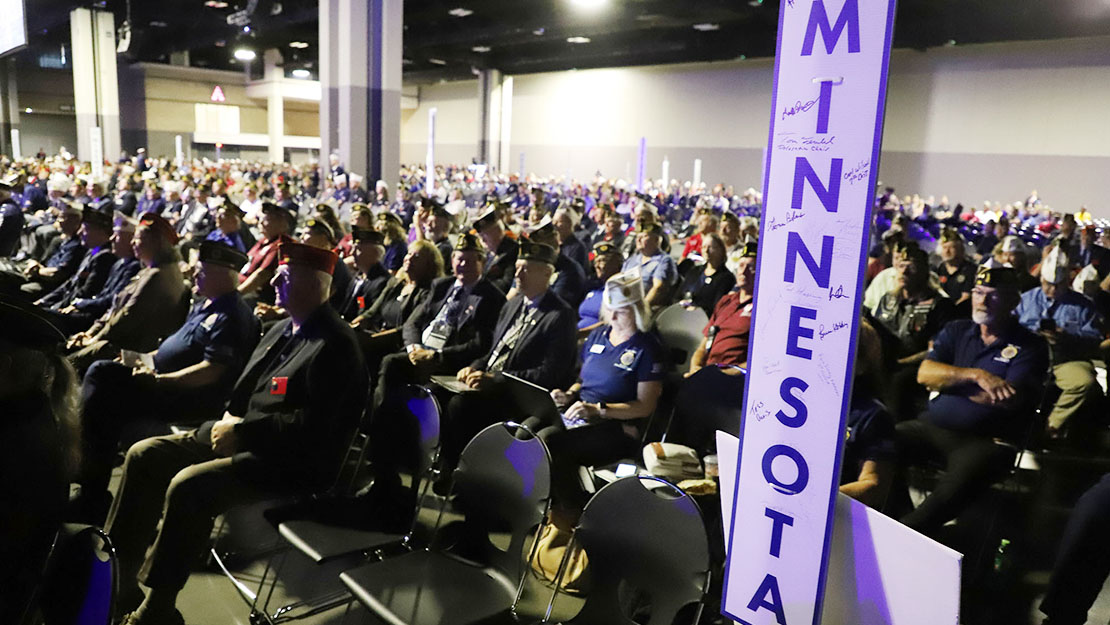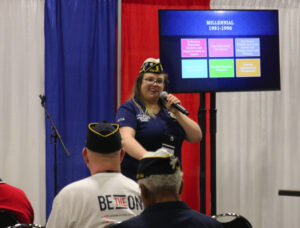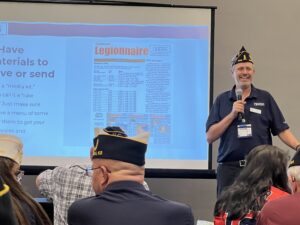2 Minnesota resolutions passed at national convention

In all, the 104th convention approved 12 measures
American Legion conventions big and small have election of officers, reports of committees, camaraderie, patriotic protocol and moments of remembrance. However, their main order of business is to review and vote on resolutions.
The 104th National Convention approved 12 resolutions, two of which hailed from Minnesota. Here they are, in numbered order:
• Resolution 3, origin South Dakota, submitted as amended and consolidated with No. 9 (New York) by Convention Committee on Veterans Affairs & Rehabilitation, says The American Legion supports legislation to amend existing language for the VA’s 10 percent rating for hypertension to read, “or; minimum evaluation for an individual who requires continuous medication for control,” and to better align all VA regulations for hypertension with the broader medical community.
• Resolution 4, origin South Dakota, submitted by Convention Committee on Veterans Affairs & Rehabilitation, says The American Legion supports amending legislation to open eligibility for government-issued markers on private graves regardless of the date of the death. The present language prohibits government-issued markers to veterans who have privately marked graves and died before Nov. 1, 1990, in opposition to the National Cemetery Administration’s own vision of ensuring “No Veteran Ever Dies.”

• Resolution 13, origin Minnesota, submitted as amended by Convention Committee on Veterans Employment & Education, requested Congress to pass a bill requiring all active duty, whether retiring or ending their term of service, to be given paperwork during outprocessing that allows them to volunteer their contact information to the national office of The American Legion. Within Minnesota, this came from Lewiston Post 90 and the 1st District.
• Resolution 14, origin Minnesota, submitted as amended by Convention Committee on Veterans Employment & Education, states The American Legion strongly advocates for the preservation of housing benefits for student veterans pursuing online education through the G.I. Bill. The resolution urges federal policymakers to recognize the importance of inclusive policies that encompass both in-person and online learning. Within Minnesota, this came from the Department VA&R Committee staff and Marissa Capra of St. Paul 3M Post 599.
• Resolution 17, origin Texas, submitted as amended by the Convention Committee on National Security, encourages The American Legion to support economic ties between the United States and Taiwan, promotes Taiwan’s membership in the United Nations, World Health Organization and other international bodies, and calls for all necessary measures to boost Taiwan’s self-defense. It also says both sides of the Taiwan Strait (essentially, the two Chinas) should promote peaceful dialogue and avoid any change that might lead to military conflict.
• Resolution 18 says The American Legion supports permanent authorization of the 199A Qualified Business Income deduction for small business because many are owned by veterans and their families.
• Resolution 19 is like Resolution 18 only for the Work Opportunity Tax Credit, or WOTC.
• Resolution 20 is like resolutions 18 and 19 but, instead of pointing to a specific item, it says The American Legion supports all tax-reducing policies and opposes tax increases. All three originated from Texas and were submitted by the Convention Committee on Veterans Employment & Education.

• Resolution 28, origin Iowa, submitted by Convention Committee on Veterans Employment & Education, states The American Legion applauds and supports the Department of the Navy for the creation of Accelerated Training in Defense Manufacturing (ATDM) to ensure a skilled workforce is available to build and maintain submarines. The resolution encourages other branches and industrial bases to follow the example.
• Resolution 30, origin Michigan, submitted as amended by Convention Committee on National Security, calls on Congress to provide adequate funding for modernizing the U.S. military and reaffirms The American Legion’s commitment to the defense of the country through a high state of readiness.
• Resolution 47, origin Virginia, submitted by Convention Committee on Internal Affairs, recognizes the Bedford Boys Tribute Center in Virginia for its role in preserving and honoring memories of World War II. The Bedford Boys are Company A, 1st Battalion, 116th Infantry Regiment, 29th Infantry Division, and were the first wave onto Omaha Beach on D-Day in 1944.
• Resolution 48, origin Virginia, submitted by Convention Committee on National Security, calls on Congress to re-shore (as in the opposite of “to off-shore”) and to expand key defense industries, including the mining of rare earth minerals, and to strengthen incentives for small businesses and new entrants to defense contracting. It suggests incentives such as targeting visa approvals for STEM talent, direct project financing and automatic fast-tracking permits. It calls for better oversight of mergers, intellectual property and acquisition. The resolution notes that a robust and secure industrial base is critical to homeland security.



